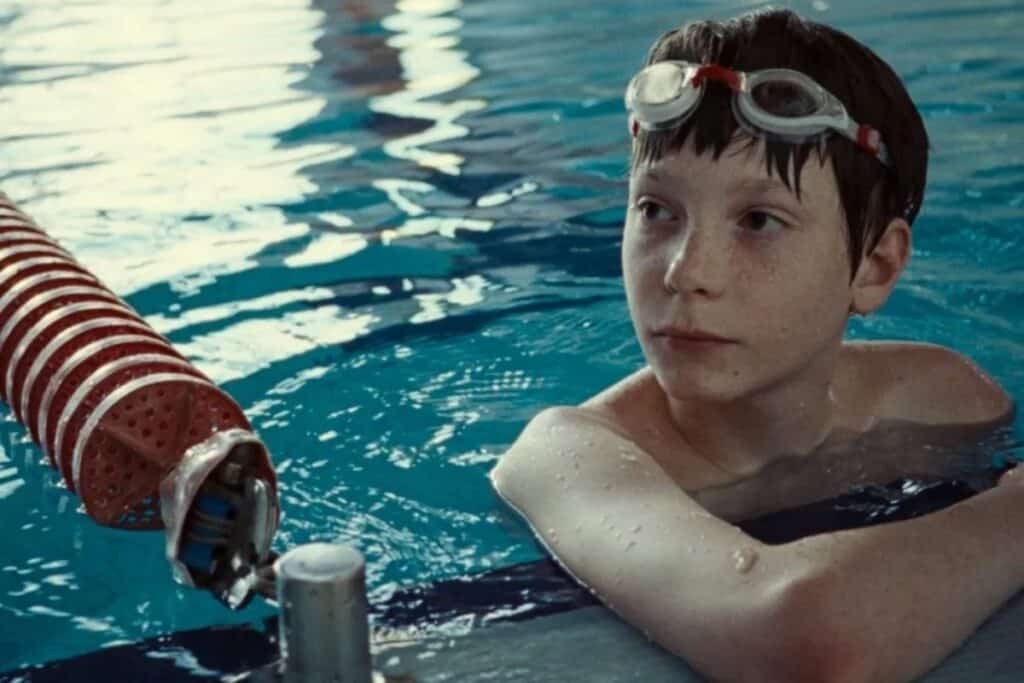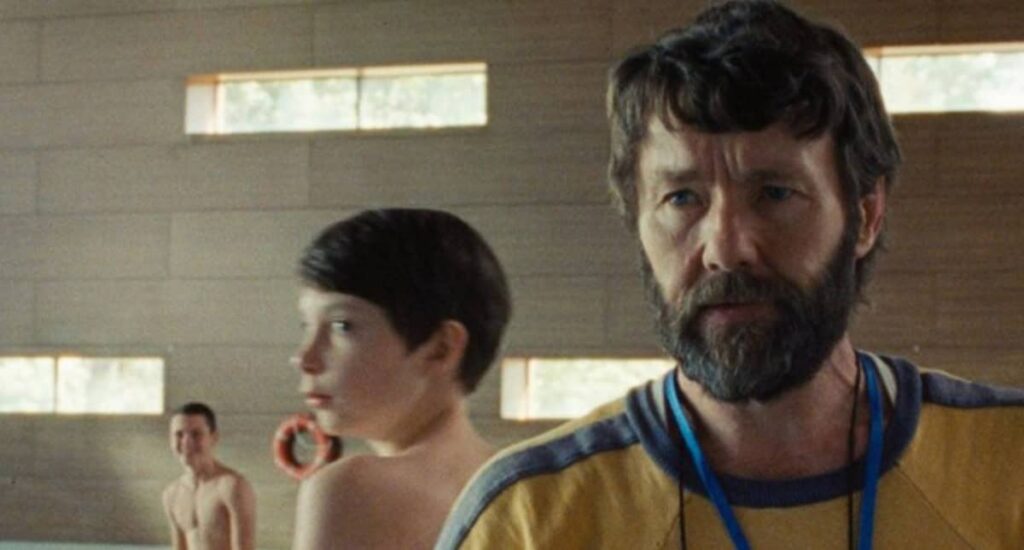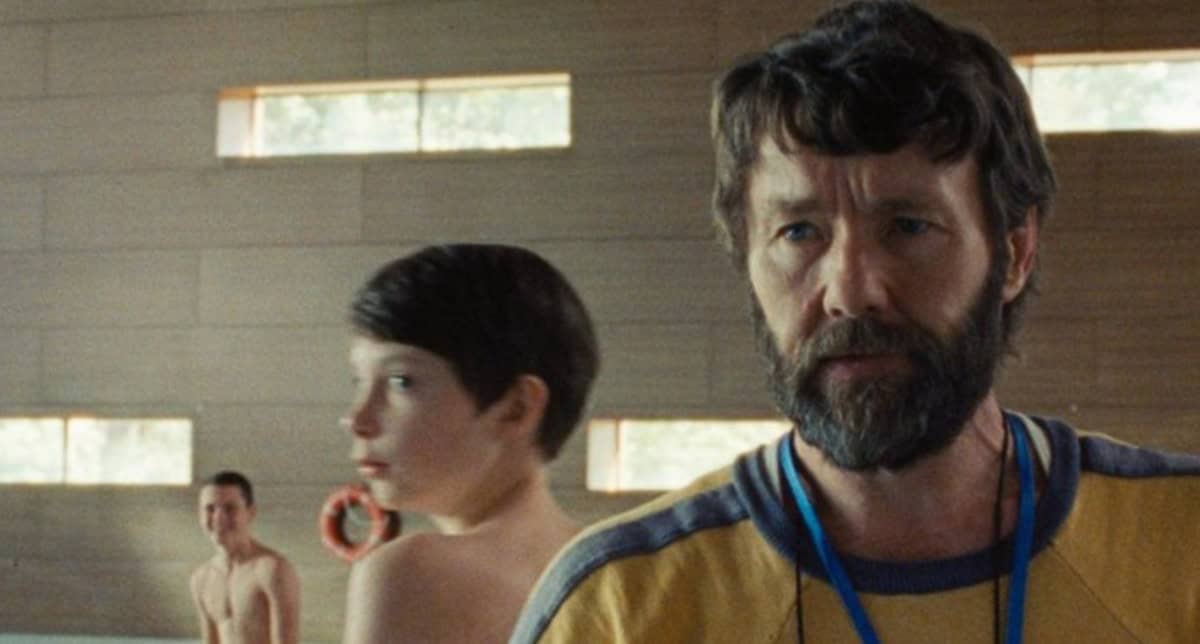Plot: A socially awkward tween endures the ruthless hierarchy at a water polo camp, his anxiety spiraling into psychological turmoil over the summer.
Review: Being a kid can be tough, regardless of gender or nationality. Of all the ages that seem to have the most difficulty, middle schoolers are the most difficult. Caught between elementary and high school with roiling hormones and burgeoning independence, tweens exist at a crossroads in life that has become exponentially more difficult in the age of social media. But, even before cell phones and online access, pre-teens suffered at the hands of rumors and bullying. Charlie Polinger’s directorial debut, The Plague, presents a horrifying portrait of the stress and trauma that transforms a particular kid in just a matter of days. It is one of the most affecting films I have seen in years, and it also serves as a beautifully filmed introduction to a filmmaker worth watching in the future. The Plague is not a traditional horror movie, but it is one of the scariest films of the year.
Set in 2003, before mobile devices transformed the way kids communicate, The Plague is set at an all-boys water polo camp. Ben (Everett Blunck) is a nervous and awkward twelve-year-old arriving at the camp after moving from Boston with his recently divorced mother. When Ben arrives, the kids have already separated into cliques. Ben immediately gravitates towards Jake (Kayo Martin), who is the de facto leader of the popular kids and a veteran of the previous camp session. Right away, Ben is branded with a mocking nickname, but he overlooks the teasing to try to stay with the group. That is when he notices the kids, led by Jake, ostracizing another camper named Eli (Kenny Rasmussen). The boys dramatically pull away from Eli and leave his vicinity when he tries to sit with them. When Ben asks why they do this, Jake tells him that Eli has “the plague”. Jake tells a story from the prior session that Eli contracted it from another camper to account for the rash visible all over Eli’s body. While doubting that it really is an infectious disease, Ben is nonetheless cautious around Eli.
The rumor of Eli’s plague status is no different from many of us who have either been victims or perpetrators of spreading it when we were twelve and thirteen. Seeing it realized in a film like this makes it all the more challenging to justify our participation in bullying or being bullied when we were younger. Charlie Polinger never outright says it, but he indicates that Eli may be autistic, as evidenced by his hyperfocus on specific subjects, social awkwardness, and a general sense of being different, something Jake homes in on and uses to excuse his own inner challenges. Caught in the middle, Ben struggles with whether he wants to be accepted by the group badly enough or get to know Eli better. Every decision that Ben makes is met with an immediate response that begins to wear his own psychological well-being down and has him questioning whether he may have the plague as well. It is a scary journey to see how brutal Jake and his cabal can be to Ben and Eli, as well as how much both boys are willing to take for the sake of not rocking the boat.

There is only one adult in the cast of The Plague. Joel Edgerton, who produced the film, plays water polo coach Daddy Wags, who tries to forge a bond with Ben. Edgerton plays his character as an understanding figure who went through a similar experience when he was a child, but fails to see just how bad things are getting when the raging hormones of these boys are amplified after bunking together day after day and night after night. While Edgerton brings some name recognition to the film, The Plague is carried by the young cast led by Everett Blunck, Kayo Martin, and Kenny Rasmussen. Kayo Martin makes for a convincing villain in the normalcy of his portrayal as Jake. We all went to school with a kid like Jake, and Martin conveys an eerily subtle menace. Kenny Rasmussen evokes the weirdness of Eli without making him a caricature, while Everett Blunck is excellent as almost every scene hinges on his performance. Blunck makes you feel bad for Ben through his nightmarish experience at the camp, but always with a realistic sense that this could have been a documentary with how natural his performance is.
Joel Edgerton initially wanted to direct The Plague, but writer Charlie Polinger insisted he wanted to make his debut. There is a dread running through The Plague that is balanced with a beauty, thanks to the 35mm film. Setting the story at a summer camp accentuates the body horror element of the fictional plague, as all of these kids must be in physical contact to play water polo. Polinger echoes the hierarchical structure of the military in how the boys bunk together and live their day-to-day, trying to forge camaraderie as a team while struggling with the testosterone surrounding them. The presence of a girls’ swimming camp at the same facility adds even more to the hormonal surge these boys contend with, and Polinger uses that simmering tension to significant effect. The Plague feels like the opening boot camp section of Full Metal Jacket, with Ben and Eli standing in as diminutive versions of Matthew Modine’s Joker and Vincent D’Onofrio’s Pyle. Johan Lenox’s score contributes to the pervasive sense that something dreadful is about to happen after every scene in the film, a tension that persists throughout the entire movie.
The Plague is a movie that everyone will relate to. We were all kids and had to deal with feeling left out or ostracized, and The Plague homes in on the awkwardness and discomfort of those experiences. It is even more relatable today as parents experience the magnification of bullying and harassment that kids must deal with in a world fully connected through social media. Not every kid is a victim, and not every kid is a bully, but puberty is an inevitable stick of dynamite that could explode at any moment. Charlie Polinger has masterfully captured the buildup to an explosion and how it could have been avoided at many points before it finally happens. The Plague is an incredible debut that is both beautifully made and terrifying to watch, and deserves every bit of acclaim it has earned. This is a movie that will make you anxious as you watch it and leave you with a lot to think about, both about your own childhood and about those who may be going through something similar now.
The Plague opens in limited release on December 24th, expanding nationwide on January 2, 2026.

Subscribe to our weekly newsletter
Source:
JoBlo.com
